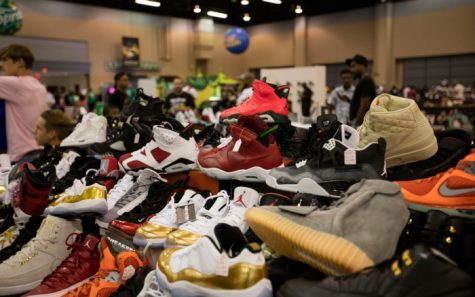The Clean Beauty Industry and The Harsh Chemicals Found in Cosmetics
October 21, 2019
Many people who wear makeup or use skincare don’t put much thought into what actually makes up the products that go on their face or body. Many companies use harsh chemicals to preserve and keep the product smelling fresh.
One of the harshest and most potent chemicals found in cosmetic and skincare products is parabens. Parabens are found in any product that has water in it, such as soap, lotion, and makeup. It is a preservative that is known to mimic estrogen in the body, which could cause hormonal imbalances and, in extreme cases, breast cancer.
“A recent study found concentrations of parabens, specifically methylparaben, in human breast tumors. Another study found 99% of all cancerous breast tumors contained parabens,” according to Coconuts and Kettlebells, a lifestyle website.
Often times companies will hide the name paraben by sticking another chemicals name in front, for example methylparaben or propylparaben. Most products that identify as clean products will have paraben free labeled on their packaging.
Another toxic chemical commonly mixed in cosmetics is phthalates. Phthalates are plasticizers commonly found in products that have plastic casings. The purpose of this chemical is to prevent the plastic casing from becoming brittle. Just like parabens, phthalates are also chemicals that impersonates estrogen in your body.
“In the past few years, researchers have linked phthalates to asthma, attention-deficit hyperactivity disorder, breast cancer, obesity and type II diabetes, low IQ, neurodevelopmental issues, behavioral issues, autism spectrum disorders, altered reproductive development and male fertility issues,” according to The Guardian.
One of the scariest substances put in just about every product is artificial fragrances and perfume. Companies are not forced to say what the fragrance is made up of, so people will see it listed as fragrance or perfume, in reality some companies use a mixture of allergens, carcinogens, and cemicals that mimic estrogen.
The reality of the beauty industry in the United States is that everyone has to do their own research and take care of their own body.
“The Food and Drug Administration (FDA) has no authority to recall toxic beauty products unless a manufacturer volunteers,” wrote Olivia Fleming and Jenna Rosenstein in a Harper Bazaar article.
The U.S. restricts 11 harsh ingredients found in cosmetics and skincare, meanwhile the European Union has a ban on over 1,300 chemicals and toxic ingredients. Compared to other countries, the U.S. lacks in laws that are preventative to people’s health and well-being.








